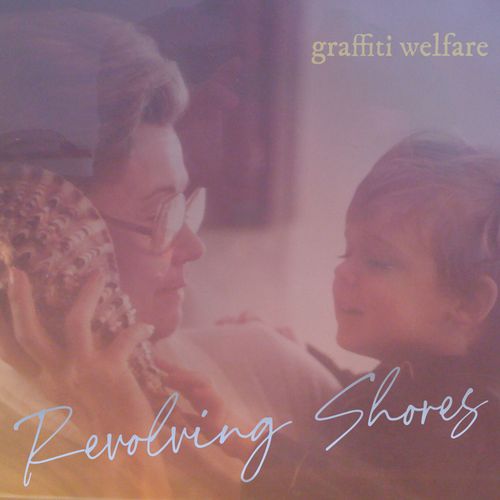Denver’s Graffiti Welfare (aka, mastermind George Lattimore) makes music to disassociate to. That’s not a dig in any sense of the word – in fact, the lush reverbs and cavernous vocal presence make for an otherworldly experience, perfect for simultaneously zoning out while listening ever-so-intently. His latest batch of music, the ten-song Revolving Shores, is archetypal in its psych-electronica approach… A solo acid trip full of thick, heady music to get lost inside of.
With some psychy, freak-out albums, it’s easy to think that there’s an avant-garde approach to the music – a more “creative and freeform flailing” as opposed to something heartfelt and pure. Graffiti Welfare finds the happy medium between the two – inspired by his grandparents that passed away during the creation of the album, Revolving Shores certainly tugs on heartstrings while maintaining its ethereal charm. Fans of anyone from Tame Impala; to Pink Floyd; to Animal Collective; to Moby will find lots of nooks and crannies to crawl into here… And they may just lead to a chasm full of luscious, experimental goodness.
Opening track “To Be It” introduces the listener to the hallmarks of Graffiti Welfare’s sound – blips and bloops aplenty with lots of warm, drippy keyboard tones and shuffling rhythms. There’s a sound clip here (ostensibly, a feature from Alan Watts) giving the otherwise instrumental track an uplifting but still spacy feel. Watts is known for his popular interpretations of Eastern philosophy, and while Revolving Shores doesn’t necessarily read as “Eastern” by any means, the overall vibe of these songs carries a certain Zen feel that is undeniable.
Album single “Deja Blue” mixes themes of color with the uncanny valley feeling of Déjà vu. A piano twinkles throughout “Blue,” bringing a splash of lightheartedness and childhood wonder to Revolving Shores. Alongside the visual accompaniment of road trips; beach vacations; and other happy memories (see the YouTube embed below); it brings a sense of wonder and nostalgia that truly compliments the track and roots itself comfortably on the album. “Blue” fades into the more EDM-flavored “Good News,” which might be the most dance-able song on the album. It’s a refreshing twist on the otherwise meditative Shores, and truly highlights Lattimore’s skill as a songwriter.
Our favorite moment on the album goes to “Nothing Ever Changes” and it’s tasty blend of psyched-out indie rock and electronica meanderings. While there are lots of enjoyable moments on Revolving Shores, this one feels the most like a “single” to us. With tasty guitar licks throughout and a consistent vocal presence, “Changes” still keeps the experimental vibe of the songs that surround it while moving and grooving in rhythmic glory.
When Graffiti Welfare isn’t singing in warped and warbled tongues, it’s clear that the music on Revolving Shores was made for meditation. The unsettling vibes on “Synesthesia” are another album highlight, taking circuit bent keyboard flutters and pairing it with chorus-laden guitar and industrial synth tones. Same goes for album closer, “Seashell” that truly lives up to its aquatic namesake with it’s underwater oeuvre.
Revolving Shores is available now on Spotify, Apple Music, and Soundcloud.

